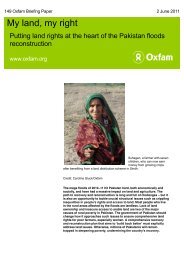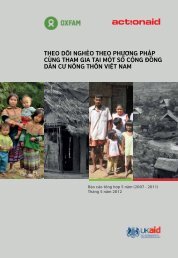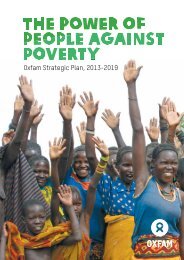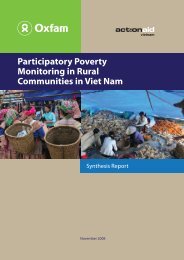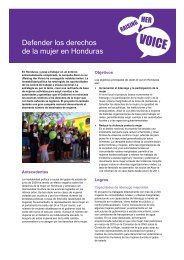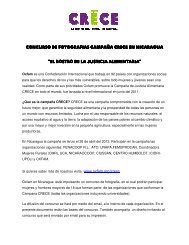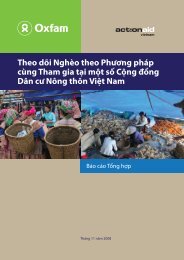Challenges to Rural Poverty Reduction in Viet Nam - Oxfam Blogs
Challenges to Rural Poverty Reduction in Viet Nam - Oxfam Blogs
Challenges to Rural Poverty Reduction in Viet Nam - Oxfam Blogs
Create successful ePaper yourself
Turn your PDF publications into a flip-book with our unique Google optimized e-Paper software.
Five-year Synthesis Report<br />
Part 2: <strong>Challenges</strong> <strong>to</strong> <strong>Rural</strong> <strong>Poverty</strong> <strong>Reduction</strong> <strong>in</strong> <strong>Viet</strong> <strong>Nam</strong><br />
TABLE 6.3. Parents’ feedback on difficulties <strong>in</strong> communication with teachers<br />
and gett<strong>in</strong>g knowledge by the national language, 2011 (%)<br />
Commune Not difficult Slightly Very difficult Don’t know<br />
difficult<br />
Thuan Hoa 14 77 9 0<br />
107<br />
Ban Lien 57 35 5 3<br />
Thanh Xuong 72 28 0 0<br />
Luong M<strong>in</strong>h 12 64 20 4<br />
Duc Huong 100 0 0 0<br />
Xy 16 56 26 2<br />
Cu Hue 47 37 16 0<br />
Phuoc Dai 36 36 2 26<br />
Phuoc Thanh 43 26 0 31<br />
Thuan Hoa 72 17 5 6<br />
Average 41 40 9 10<br />
SOURCE: Households <strong>in</strong>terviews<br />
“Bil<strong>in</strong>gual teach<strong>in</strong>g” and us<strong>in</strong>g “teachers’ support staff” are two methods <strong>to</strong><br />
overcome the language barriers for the ethnic m<strong>in</strong>orities’ primary students.<br />
However, “bil<strong>in</strong>gual teach<strong>in</strong>g” <strong>in</strong> the ethnic m<strong>in</strong>ority mounta<strong>in</strong>ous areas is currently<br />
difficult due <strong>to</strong> limited fund<strong>in</strong>g, and shortages of teachers and materials. The “Teachers’<br />
Support Staff” programme was highly praised by communities and schools, but f<strong>in</strong>ished<br />
<strong>in</strong> 2010 after fund<strong>in</strong>g from the World Bank ended (Box 6.2).<br />
BOX 6.2. The <strong>in</strong>itiative “teachers’ support staff” at the remote villages<br />
should be ma<strong>in</strong>ta<strong>in</strong>ed<br />
At the moni<strong>to</strong>r<strong>in</strong>g po<strong>in</strong>ts <strong>in</strong> ethnic m<strong>in</strong>ority mounta<strong>in</strong>ous areas, bil<strong>in</strong>gual teach<strong>in</strong>g (<strong>in</strong><br />
<strong>Viet</strong>namese and local dialects) are not a common practice. Among the ten moni<strong>to</strong>r<strong>in</strong>g<br />
po<strong>in</strong>ts, only Cu Hue - Dak Lak has two classes <strong>in</strong> the Ede language. Although the Ede<br />
parents highly praise these classes, the Ede students themselves are not so eager.<br />
While the bil<strong>in</strong>gual teach<strong>in</strong>g is encounter<strong>in</strong>g difficulties, the use of “teachers’ support<br />
staff” by the “Primary Education for Disadvantaged Children” Project (PEDC - funded by<br />
the World Bank <strong>to</strong> implement <strong>in</strong> 226 districts of 40 prov<strong>in</strong>ces) at the remote villages is<br />
a practical solution. The “teachers’ support staff” are local ethnic m<strong>in</strong>ority people, and<br />
can serve as a bridge l<strong>in</strong>k<strong>in</strong>g teachers, families and the local community, can encourage<br />
children <strong>to</strong> go <strong>to</strong> school, prepare lessons and teach<strong>in</strong>g aids, and work as <strong>in</strong>terpreters<br />
dur<strong>in</strong>g the lectur<strong>in</strong>g. In some moni<strong>to</strong>r<strong>in</strong>g po<strong>in</strong>ts with a high number of ethnic m<strong>in</strong>orities’<br />
children, the teachers are rotat<strong>in</strong>g and so they don’t know the local language, and so<br />
the “teachers’ support staff” <strong>in</strong>itiative is highly valued by the community and schools <strong>in</strong><br />
remov<strong>in</strong>g language barriers for children from ethnic m<strong>in</strong>orities.<br />
The PEDC Project ended <strong>in</strong> 2010, so there were no more “teachers’ support staff”.<br />
Those hav<strong>in</strong>g been employed as teachers’ support staff say that they want <strong>to</strong> cont<strong>in</strong>ue<br />
this job, and want <strong>to</strong> cont<strong>in</strong>ue their study so that they can work as teachers <strong>in</strong> the<br />
future. Ma<strong>in</strong>ta<strong>in</strong><strong>in</strong>g this model is a recommendation of all schools at the moni<strong>to</strong>r<strong>in</strong>g<br />
po<strong>in</strong>ts that have participated <strong>in</strong> the PEDC project.




